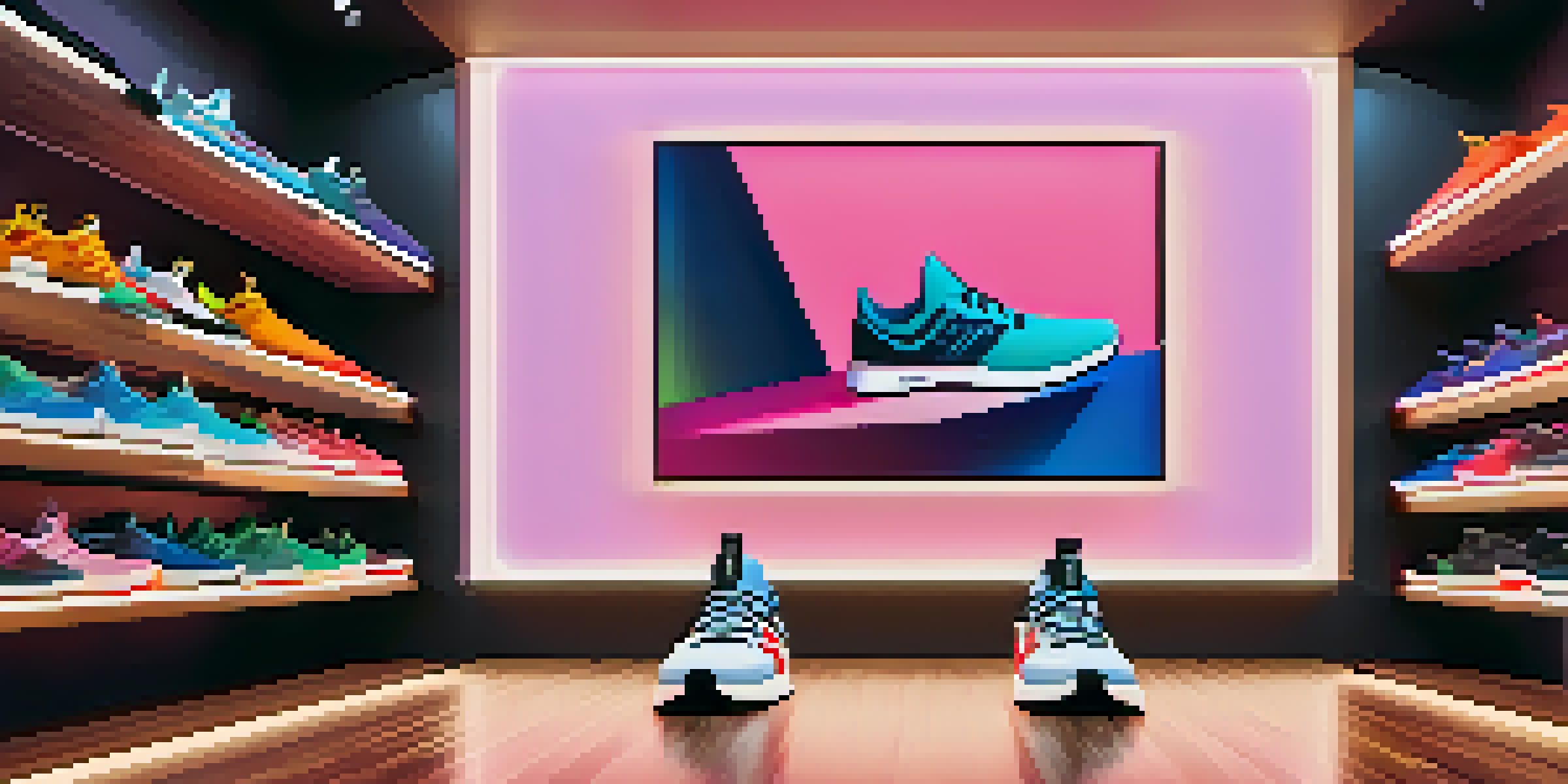Creating Unique Shopping Experiences with NFTs in E-Commerce

Understanding NFTs and Their Role in E-Commerce
Non-fungible tokens, or NFTs, are digital assets that represent ownership of unique items. Unlike cryptocurrencies like Bitcoin, which are interchangeable, NFTs are one-of-a-kind, making them perfect for representing digital collectibles, art, and even real-world products. In e-commerce, NFTs can provide a new layer of value and authenticity to products, paving the way for unique shopping experiences.
The future of commerce is digital, and NFTs are a bridge to a more engaging and personalized shopping experience.
Imagine purchasing a limited-edition sneaker that not only comes in physical form but also includes an NFT as proof of authenticity. This NFT can be verified on the blockchain, ensuring that what you own is genuine and exclusive. This combination of physical and digital ownership opens doors for brands to create more engaging and personalized shopping experiences.
Furthermore, NFTs can facilitate community-building around brands. By owning a brand's NFT, customers may gain access to exclusive events, discounts, or even early releases of new products, fostering loyalty and a sense of belonging that traditional e-commerce lacks.
Creating Scarcity and Exclusivity Through NFTs
Scarcity is a powerful marketing tool, and NFTs can amplify that effect in e-commerce. By issuing limited quantities of digital assets tied to physical products, brands can create a sense of urgency among consumers. Think about how much more appealing a product becomes when customers know that only a select few will own it.

For instance, a fashion brand might release a new clothing line alongside a limited set of NFTs. Those who purchase the NFT could unlock special editions of the clothing, exclusive styles, or even personalized designs. This not only drives initial sales but also encourages customers to engage with the brand and the product long after the purchase.
NFTs Enhance E-Commerce Value
NFTs provide authenticity and unique experiences in e-commerce by linking digital assets to physical products.
Exclusivity can also extend to experiences. Brands can offer NFT holders VIP access to online events, early product drops, or even one-on-one consultations with designers. This creates a unique value proposition that distinguishes them from competitors, making the shopping experience more memorable.
Enhancing Customer Engagement with Interactive NFTs
Interactive NFTs can take customer engagement to a whole new level. Imagine a digital collectible that evolves based on how much you interact with a brand. For example, an NFT could change colors or unlock new features as you make purchases or participate in brand-related events, creating a gamified shopping experience.
In a world where consumers crave authenticity, NFTs provide a unique way to prove ownership and foster loyalty.
This not only keeps customers invested but also encourages them to explore different aspects of the brand. The more they engage, the more their NFT evolves, providing a sense of achievement and ownership that traditional shopping lacks. It’s much like leveling up in a video game—each interaction brings new rewards.
Moreover, these interactive NFTs can be shared or showcased on social media, allowing customers to show off their unique digital assets. This encourages organic marketing as friends and followers become curious about the brand and the experiences associated with it.
Building Brand Loyalty Through NFT Ownership
NFTs can serve as a powerful tool for building brand loyalty. When customers purchase an NFT, they aren’t just buying a digital item; they’re becoming part of an exclusive club. This sense of belonging can significantly enhance customer loyalty, as they feel more connected to the brand and its community.
For example, a brand could reward NFT holders with points that can be redeemed for discounts or special offers. This not only incentivizes purchases but also encourages customers to keep their NFTs for longer periods, further cementing their loyalty. The emotional connection created through this ownership can lead to repeat business and referrals.
Creating Scarcity Drives Demand
Limited edition NFTs can create urgency among consumers, amplifying the appeal of products and fostering brand engagement.
Additionally, brands can use NFTs to gather feedback and insights from their most loyal customers. By creating special polls or events exclusive to NFT holders, brands can better understand their audience's preferences and tailor their offerings accordingly.
Leveraging NFTs for Sustainable Practices in E-Commerce
Sustainability is becoming increasingly important to consumers, and NFTs can play a role in promoting eco-friendly practices. Brands can use NFTs to track the lifecycle of their products, providing transparency about sourcing, production, and environmental impact. This added layer of information can appeal to conscious consumers who prioritize sustainability in their purchasing decisions.
For example, a furniture company could issue NFTs that demonstrate the sustainable materials used in its products and the ethical practices behind their production. This not only informs customers but also allows them to feel good about their purchase, knowing they are supporting a brand that aligns with their values.
Moreover, brands can use NFTs to promote recycling and reusing products. Customers could trade or sell their NFTs back to the brand for discounts on future purchases, fostering a circular economy that benefits both the brand and the environment.
Navigating Legal and Technical Challenges of NFTs
While NFTs offer exciting opportunities for e-commerce, they also come with legal and technical challenges. Intellectual property rights can become murky, especially when it comes to digital art or products represented by NFTs. Brands must ensure they have the necessary rights to create and sell NFTs associated with their products to avoid legal complications.
Additionally, the technology behind NFTs can be daunting for some brands. Understanding blockchain, smart contracts, and cryptocurrency can require a steep learning curve. However, by partnering with experienced developers or platforms, brands can navigate these complexities and implement NFT strategies effectively.
Building Loyalty with NFT Ownership
Owning NFTs fosters a sense of belonging and loyalty among customers, enhancing their connection to brands and encouraging repeat purchases.
It's also crucial for brands to educate their customers about NFTs. Many consumers are still unfamiliar with this technology, so providing clear information can help demystify the process and encourage adoption. This educational aspect can enhance trust and create a smoother transition into the world of NFTs.
Future Trends of NFTs in E-Commerce to Watch
As the digital landscape continues to evolve, the future of NFTs in e-commerce looks promising. One exciting trend is the integration of augmented reality (AR) with NFTs, allowing customers to visualize products in their own space before making a purchase. Imagine being able to see how a piece of art would look on your wall through your smartphone before buying it, all while having an NFT tied to that specific piece.
Another trend to watch is the rise of community-driven marketplaces for NFTs. These platforms can empower consumers to trade or sell their NFTs among themselves, creating a vibrant ecosystem around the brand's products. This peer-to-peer interaction can enhance customer engagement and loyalty, as customers feel they are part of a larger community.

Furthermore, as more brands adopt NFTs, we may see innovative collaborations between brands, artists, and influencers, blending e-commerce with creativity. These collaborations can lead to unique product offerings that captivate consumers and drive sales, ensuring that NFTs remain at the forefront of e-commerce innovation.